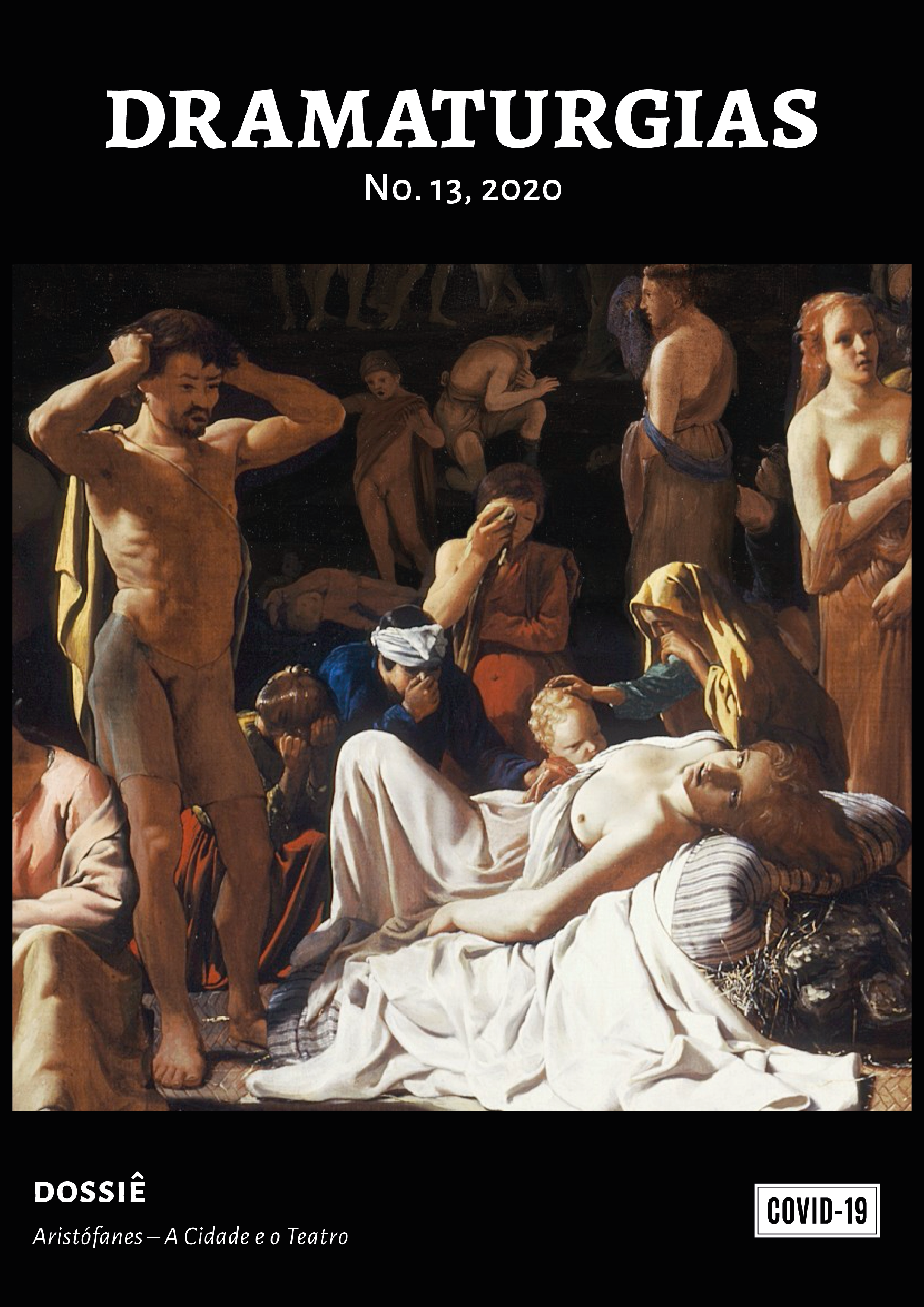‘Honrado y buen ciudadano’: El delator de Pluto de Aristófanes
DOI :
https://doi.org/10.26512/dramaturgias.vi13.31058Mots-clés :
Pluto. Delator. Impostores.Résumé
La hostilidad contra los delatores es una nota característica de toda la comedia aristofánica ”“ manifiesta en expresiones denigratorias hacia su figura o como forma de insulto ”“ y tres son las comedias que lo tienen entre sus personajes: Acarnienses, Aves y Pluto. En la última se le concede al delator la posibilidad de expresar más extensamente sus reclamos, así como argumentar y defender su modo de vida, al que se mantiene fiel, inmune a toda transformación. Proponemos una traducción al español de la escena donde interviene (vv. 550-958), enriquecida con notas, y un análisis posterior sobre sus aspectos más destacados.
Téléchargements
Références
BUIS, E. El juego de la ley. La poética cómica del derecho en las obras tempranas de Aristófanes (427-411 a.C.). Madrid: Dykinson, 2019.
BUIS, E. J. “Law and Greek Comedy”. In: M. Fontaine & A. C. Scafuro (eds.). The Oxford Handbook of Greek and Roman Comedy. Oxford: Oxford University Press, 2014, pp. 321”“339.
BURKERT, W. Greek Religion. Cambridge (MA): Harvard University Press, 1985. CARRIERE, J.C. Le carnaval et la politique. Une introduction à la Comédie grecque,
suivre d'un choix de fragments. Paris: Les Belles Lettres, 1979. CARTLEDGE, P. Aristophanes and His Theatre of the Absurd. London: Bristol
Classical Press, 1990.
CORNFORD, F.M. The Origin of Attic Comedy. Michigan: University of Michingan
Press, 1993
COULON, V. (ed.) Aristophane: Texte établi par V. Coulon et traduit par H. Van
Daele. Paris: Les Belles Lettres, 1923-1930.
DILLON, M. “Topicality in Aristophanes' Ploutos”. In: ClAnt VI (1987): 155-83. DOGANIS, C. K. “La sycophantie dans la démocratie athénienne d'apré€s les
comédies d'Aristophane”. In: Journal des savants 2 (2001): 225-248. DOVER, K.J. Aristophanic Comedy, Berkeley-Los Angeles: University of California
Press, 1972.
FERNÁNDEZ, C. N. (ed.) Aristófanes: Pluto. Introducción, traducción y notas
de Claudia Fernández. Buenos Aires: Editorial Losada, 2011.
59 “Le Sycophante se défend d’être un coquin, c’est assez naturel, et non moins naturellement il se croit lésé; là ouÌ€ il dépasse la mesure, c’est lorsqu’il accuse les autres de détenir l’argent qu’il devrait posséder: en cela surtout il est dans son roÌ‚le”. (van daele, en coulon 1930: 130).
FERNÁNDEZ, C. N. "Filólogos devenidos traductores". In: T. Ribeiro Barbosa, A. Palma & A.M. Chiarini (eds.). Teatro e traduçao de teatro, vol. 1. Belo Horizonte: Relicário EdiçoÌ‚es, 2017, pp. 95-123.
FISHER, N. Hybris: A Study in the Values of Honour and Shame in Ancient Greece. Warminster: Aris and Phillips, 1992.
GRIFFITH R. & MARKS R. A Funny Thing Happened on the Way to the Agora: Ancient Greek and Roman Humour. Kingston: Legacy Books Press, 2007. HANSENM.H. AthenianDemocracyintheAgeofDemosthenes:Structure,Principles
and Ideology. Oxford: Blackwell, 1991.
HARRIS, E. M., D. F. Leão & P. J. Rhodes (eds.) Law and Drama in Ancient Greece.
London: Duckworth. 2010.
HARVEY, D. “The sykophant and sykophancy: vexatious redefinition?”. In: P.
Cartledge, P. Millet & S. Todd (eds.). Nomos: Essays in Athenian Law, Politics
and Society. Cambridge: Cambridge University Press, 1990, pp. 103-21. HEBERLEIN, F. “Zur Ironie im 'Plutos' des Aristophanes”. In: WJA N.F. VII
(1981): 27-49.
JOUAN, F. “Les tribunaux comiques d’Athé€nes”. In: J. Jouanna (ed.). Le théá‚tre
grec antique: la comédie, Actes du X Colloque de la Villa Kérylos à Beaulieu”“sur”“
Mer, 1”“2, octobre 1999, Cahiers 10 (2000): 83”“98.
KONSTAN, D. & DILLON, M.“The ideology of Aristophanes' Wealth”. In: AJPh
102 (1981): 371-94.
LIANERI, A. & ZAJKO, V. (eds.) Translation and the Classic. Identity as Change in
the History of Culture. Oxford: Oxford University Press, 2008.
LOFBERG, J. Sycophancy in Athens. Chicago, 1976.
MAURACH, G. “Interpretationen zur Attischen Komödie”. In: AClass 11 (1968):
pp. 1-24.
MAZON, P. “La farsa en Aristófanes y el origen de la comedia en Grecia”. In:
Cuadernos de Arte Dramático. Suplementos de estudio no 16 (1953).
MCLEISH, K. The Theatre of Aristophanes. Bath: Thames & Hudson, 1980. MEDDA, E. “Aristofane e il monologo”. In: P. Mureddu & G. F.Nieddu (eds.).
Comicità e riso tra Aristofane e Menandro. Amsterdam: Adolf M Hakkert Editore,
2006, pp. 91-112.
MURRAY, G. Aristophanes: a Study. Oxford: Clarendon Press, 1965. OSBORNE, R. “Vexatious litigation in classical Athens: sycophancy and the
sykophant”. In: P. Cartledge, P. Millet & S. Todd (eds.). Nomos: Essays in Athenian Law, Politics and Society. Cambridge: Cambridge University Press, 1990, pp. 83-102.
PELLEGRINO, M. La maschera comica del Sicofante. Lecce: Pensa Multimedia, 2010.
PICKARD-CAMBRIDGE, A. Dithyramb, Tragedy and Comedy. Oxford: Clarendon Press. 1927.
REVERMANN, M. Comic Business. Theatricality, Dramatic Technique, and Performance Contexts of Aristophanic Comedy. Oxford: Oxford University Press, 2006.
RUBISTEIN, L. “Volunteer Prosecutors in the Greek World”. In: Dike. Rivista di storia del diritto greco ed ellenistico 6 (2004): 87-113.
SIFAKIS, G. “The Structure of Aristophanic Comedy”. In: JHS CXII (1992): 123-142.
SOMMERSTEIN, A. (ed.) The Comedies of Aristophanes, vol. 11. Wealth. Edited with translation and notes by Alan H. Sommerstein, Warminster. Aris & Phillips 2001
SOMMERSTEIN, A.H. The Comedies of Aristophanes, vol. 1. Acharnians, edited with translation and notes by Alan H. Sommerstein. Warminster: Aris & Phillips, 19923.
TODD, S.C. “The personnel of Procedure”. In: The Shape of Athenian Law; 1993, pp. 77-97.
USSHER, R.G. Aristophanes. Oxford: Oxford University Press, 1979.
VAN LEEUWEN, J. Aristophanis. Cum Prolegomenis et commentariis. Editit
J. Van Leeuwen J. F. Leiden: Lugduni Batavorum, 1893-1906.
VENUTI, L. The Translator's Invisibility: A History of Translation. London: Routledge,
1995.
ZIMMERMANN, B. “L'organizzazione interna delle commedie di Aristofane”.
In: Dioniso LVII (1987): 49-64.
Téléchargements
Publié-e
Comment citer
Numéro
Rubrique
Licence
Autores mantém os direitos autorais e concedem à revista o direito de primeira publicação, com o trabalho simultaneamente licenciado sob a Licença Creative Commons Attribution que permite o compartilhamento do trabalho com reconhecimento da autoria e publicação inicial nesta revista.



